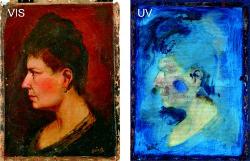Feb 4 2010
Scientists in Poland are describing how a medical imaging technique has taken on a second life in revealing forgery of an artist's signature and changes in inscriptions on paintings that are hundreds of years old. A report on the technique, called optical coherence tomography (OCT), is in ACS' Accounts of Chemical Research, a monthly journal.
 The oil painting on the left fluoresces to reveal hidden details (right) when exposed to a new noninvasive imaging technique that uses ultraviolet light
The oil painting on the left fluoresces to reveal hidden details (right) when exposed to a new noninvasive imaging technique that uses ultraviolet light
Piotr Targowski notes that easel paintings prepared according to traditional techniques consist of multiple layers. The artist, for instance, first applies a glue sizing over the canvas to ensure proper adhesion of later layers. Those layers may include an outline of the painting, the painting itself, layers of semitransparent glazes, and finally transparent varnish. Art conservators and other experts resort to a variety of technologies to see below the surface and detect changes, including forged signatures and other alterations in a painting. But those approaches may damage artistic treasures or not be sensitive enough to detect finer details.
The scientists describe how OCT, used to produce three-dimensional images of the layers of the retina of the eye, overcomes those difficulties. They used OCT to analyze two oil paintings from the 18th and 19th centuries. In one, "Saint Leonard of Porto Maurizio," OCT revealed evidence that the inscription "St. Leonard" was added approximately fifty years after completion of the painting. In the other, "Portrait of an unknown woman," OCT found evidence of the possible of forgery of the artist's signature.